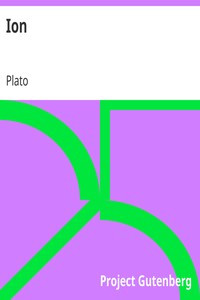Ion by Plato
"Ion" by Plato is a Socratic dialogue that belongs to the genre of philosophical literature, dating back to the classical period of Ancient Greece. The work showcases a conversation between Socrates and Ion, a rhapsode who specializes in interpreting the works of Homer. The central theme of "Ion" revolves around the nature of inspiration in poetry and the intellectual capabilities of poets versus those who analyze their work. In this short dialogue,
Socrates engages Ion in a discussion about his ability to interpret Homeric poetry. Ion asserts that he speaks beautifully about Homer but admits to having no knowledge of other poets. Socrates challenges Ion’s claims, leading him to recognize that his talent for interpreting Homer arises not from artistic knowledge but from divine inspiration. Through a metaphorical discussion, Socrates describes poets and rhapsodes as being similar to a chain of magnets, indicating that true creativity and expression in poetry come from a higher source. In the end, Socrates suggests that Ion is not a skilled artist but rather inspired, leaving the question of artistic knowledge and the source of creativity open for reflection. (This is an automatically generated summary.)
Read or download for free
| How to read | Url | Size | |||
|---|---|---|---|---|---|
| Read now! | https://www.gutenberg.org/ebooks/1635.html.images | 67 kB | |||
| EPUB3 (E-readers incl. Send-to-Kindle) | https://www.gutenberg.org/ebooks/1635.epub3.images | 73 kB | |||
| EPUB (older E-readers) | https://www.gutenberg.org/ebooks/1635.epub.images | 72 kB | |||
| Kindle | https://www.gutenberg.org/ebooks/1635.kf8.images | 137 kB | |||
| older Kindles | https://www.gutenberg.org/ebooks/1635.kindle.images | 130 kB | |||
| Plain Text UTF-8 | https://www.gutenberg.org/ebooks/1635.txt.utf-8 | 55 kB | |||
| Download HTML (zip) | https://www.gutenberg.org/cache/epub/1635/pg1635-h.zip | 70 kB | |||
| There may be more files related to this item. | |||||
Similar Books
About this eBook
| Author | Plato, 428? BCE-348? BCE |
|---|---|
| Translator | Jowett, Benjamin, 1817-1893 |
| Title | Ion |
| Note | Wikipedia page about this book: https://en.wikipedia.org/wiki/Ion_(dialogue) |
| Note | Reading ease score: 73.2 (7th grade). Fairly easy to read. |
| Credits | Produced by Sue Asscher, and David Widger |
| Language | English |
| LoC Class | PA: Language and Literatures: Classical Languages and Literature |
| Subject | Classical literature |
| Subject | Homer. Iliad |
| Subject | Poetics -- History -- To 1500 |
| Subject | Aesthetics, Ancient |
| Category | Text |
| EBook-No. | 1635 |
| Release Date | Feb 1, 1999 |
| Most Recently Updated | Jan 16, 2013 |
| Copyright Status | Public domain in the USA. |
| Downloads | 1279 downloads in the last 30 days. |
| Project Gutenberg eBooks are always free! | |

